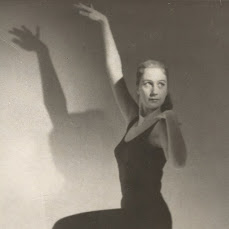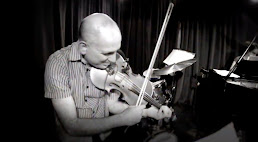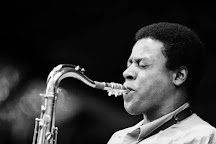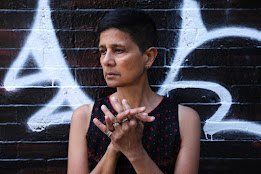Dr. Anthony Branker is quite an accomplished person with a list of achievements that would fill this page. I spoke to him in 2017 at the time Origin Records released "
Beauty Within", his seventh album of original compositions (and six issued by the Seattle, WA-based label). At that time, he had recently stepped down as the head (and founder) of the Jazz Studies Program at Princeton––he currently is Adjunct Professor at the Mason Gross School of Music at Rutgers University. I am impressed by his ability to tell stories, truths about issues such as racism, equality, spirituality, and more, writing music that sounds familiar yet can be challenging, swings yet sings. The son of Caribbean immigrants, Dr. Branker once played his music (he was a trumpet player) in venues around the world. Dr. Branker has also conducted ensembles for Terence Blanchard and Wynton Marsalis as well as orchestras in Israel, Germany, Japan, Estonia, and in the United States.

His eighth album, "
What Place Can Be For Us: A Suite In 10 Movements" (Origin), is the second recording with his Imagine ensemble, an octet built around guitarist
Pete McCann, pianist
Fabian Almazan, and bassist
Linda May Han Oh plus
Walter Smith III (tenor saxophone),
Remy Le Boeuf (alto and soprano saxophones),
Philip Dizack (trumpet, flugelhorn),
Donald Edwards (drums), and on two tracks,
Alison Crockett (vocal and spoken word). As you should be able to tell by the title, the themes of this new collection are inclusion, immigration, belonging, citizenship, and the never-ending racism that permeates the United States. Ms. Crockett is featured on the opening track, "
The Door of No Return", an episodic that blends the squalling guitar of Pete McCann, the telegraph notes from the piano, and the words of poet
Beatriz Esmer. There is a powerful solo from Smith III as well as well as brilliant background arrangements. The words hearken back to The Middle Passage (many more Black Africans were enslaved in Brazil than anywhere else on the American continent).

Ms. Crockett returns for "
I, Too, Sing America" from Langston Hughes 1926 collection "
The Weary Blues". It's a powerful work with fine piano work and a commanding solo from Smith III yet be sure to listen to how the alto sax and trumpet play a drone beneath the tenor sax and the heartfelt vocal.
Elsewhere, there's the nervous energy of McCann's guitar solo and the wistful alto sax solo from Le Boeuf on "Indivisible", the melancholy reminiscence of "Sundown Town" with far-ranging solos from Almazan and Dizack, and the "prog-rock meets hard bop" riff on "Sanctuary City" and the crackling guitar of McCann and keening tenor sax.
It's hard not to think of boats filled with refugees on "
We Went Where Wind Took Us" but the music has more of a hopeful feel as well as fine solos from Ms. Oh and Almazan. After a lovely solo piano introduction, "
The Trail of Tears to Standing Rock" reminds us all of how the Andrew Jackson Presidency pushed Native Americans onto lands where their crops could not grow; not that succeeding US Presidents made the situation any better, creating reservations that keep them held down. Now when they fight the oil pipeline that will split their land up and subsequently cut them off from or contaminate their water supply, their protests still fall on deaf ears.
As you should be able to tell, Dr. Anthony Branker does not shy away from controversy; instead he channels his concerns, beliefs, and his fears into music that often vibrates with urgency, compassion, commitment, and impressive musicianship. Don't you shy away from "What Place Can Be For Us: A Suite In 10 Movements"––instead, embrace its activism, its message, and its power.
Here's the ensemble playing and presenting the words of poet Langston Hughes on "
I, Too, Sing America":
Vocalist and educator Christine Correa came to the United States from her native Bombay, India, in 1979––she came to attend the New England Conservatory of Music in Boston, MA, which is where she met two people who became very important in her life, pianist Ran Blake and pianist Frank Carlberg who is a frequent collaborator as well as her husband. Ms. Correa is currently on the faculties of Columbia University’s Louis Armstrong Jazz Performance Program, Teacher’s College at Columbia University and the New School as well as the Director of the Maine Jazz Camp. She's recorded five duo albums with Ran Blake, 10 albums (in groups of various sizes) with Mr. Carlberg, and, at least, a half-dozen with other artists but never an album under own name.
Until now. "
Just You Stand and Listen With Me" (Sunnyside Records) is a tribute to two recordings drummer Max Roach recorded with his then-wife, the vocalist Abbey Lincoln, 1961's "
We Insist! Freedom Now Suite" (Candid Records) and "
Percussion Bitter Suite" (Impulse! Records). For her album, Ms. Correa utilizes the musical voices of
Sam Newsome (soprano saxophone),
Andrew Boudreau (piano),
Kim Cass (bass), and
Michael Sarin (drums). The 11-song program opens with the opening cut from "
We Insist!", "
Driva' Man", a fiery slave song with lyrics by Oscar Brown, Jr. Ms. Correa's vocal is underpinned by the strolling rhythm section bolstered by the angular piano chords. Newsome's soprano solo is soaring and free-wheeling while Sarin's narrative drums over the walking bass also stands out.
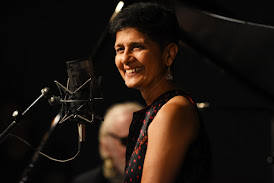
Brown, Jr. adapts Paul Lawrence Dunbar's poem "
When Malindy Sings"––the poet wrote his piece in "original" dialect but this adaptation is no "Uncle Remus". The music really swings with kudos to Boudreau for a fine solo. Ms. Lincoln wrote the words for "
Mendacity"; her lyrics could have been written today. Here's an example; "
The campaign trail winds on and on/In towns from coast to coast/The winner ain't the one who's straight/But he who lies the most." Sarin's drums are quite expressive while Newsome again serves as response to Ms. Correa's call. Listen below!
There's so much to take on this brilliant album. Ms. Correa's duet with drummer Sarin in the first 90 seconds of "All Africa" is a stunning introduction to the body of the song in which the vocals name various tribes of the African Continent. The soprano sax solo over the drums is powerful, very moving and expressive. The wordless vocals on "Tears for Johannesburg" speaks to the treatment of the oppressed black citizens under South Africa's apartheid regimes. The ensemble moves in and out of time throughout plus there are excellent solos from Newsome and bassist Cass.
The album closes with Brown, Jr./Roach's "Freedom Day", a piece that is, at times, frolicsome, free, impulsive, pulsing with urgency, and in the end, questioning if we are really "free" (certainly the Black population of the United States has rarely been truly free to be).
From start to finish, "Just You Stand and Listen With Me" is quite powerful. Christine Correa not only celebrates the amazing and controversial music of Max Roach, Abbey Lincoln, and Oscar Brown, Jr. but also asks questions about whether her adopted country–the United States–can ever truly be the place where "All Men (and Women) Are Created Equal".


